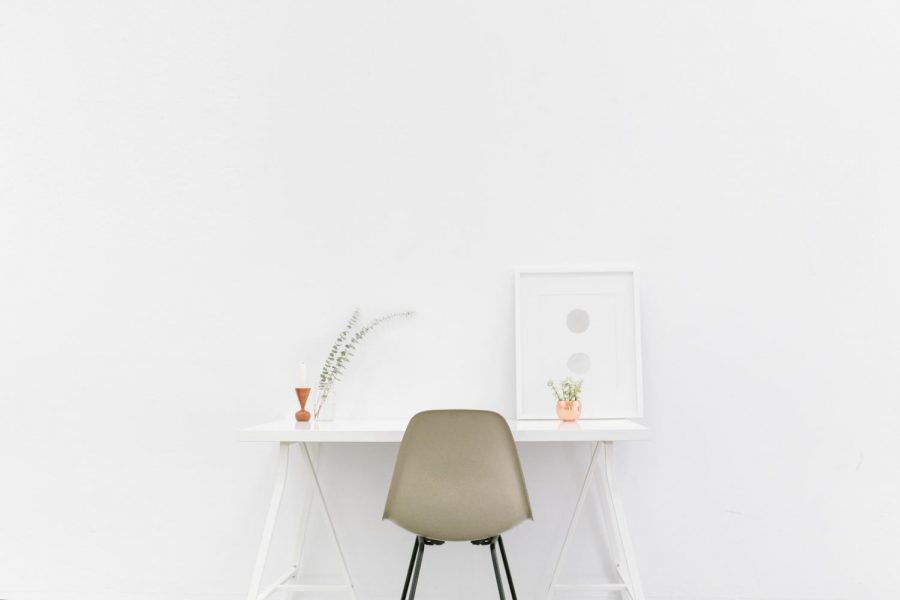Minimalism for Mental Health
December 12, 2020
Minimalism for Mental Health
It’s essential to find ways to relax, especially now, when new stressors always seem to be just around the corner. While participating in activities such as meditation or yoga are excellent ways to do just that, you may find yourself wanting something more.
Minimalism is another great way to improve your mental health, and the perfect project to get started on over winter break!
What is Minimalism?
Minimalism looks different for everyone. Joshua Fields Millburn and Ryan Nicodemus, the founders of The Minimalists, describe minimalism as “a lifestyle that helps people question what things add value to their lives. By clearing the clutter from life’s path, we can all make room for the most important aspects of life”.
There is not a defined list of things that every person must get rid of to see results in their lives. It will vary from person to person, as we are all unique in our own way. Getting rid of excess clutter in your life will allow room for happiness.
How Can Minimalism Improve My Mental Health?
There are many ways that being a minimalist can help the state of your mental health. As a minimalist, you will find yourself dealing with fewer worries throughout your day. Sally Augustin, Ph.D., states “Cognitive science confirms what our own life experiences tell us—getting rid of the extra stuff around us boosts our mental health and wellbeing” in her article, “It’s Time to De-Clutter!”.
Minimalism Helps With Mindfulness – Sometimes it can be hard to live in the moment. We might dwell on the past, wanting things to be as they were. Or perhaps worry about the future, wondering how things will turn out. In both situations, we might hold on to certain items that don’t make us happy or have meaning for us anymore. By keeping only the things that have purpose to us in the present moment, we will find ourselves being more mindful.
Minimalism Reduces The Mental Load – According to psychologytoday, “It’s mentally exhausting for us to see clutter, so clutter makes us tense.” When we have less stuff in general, it is easier to focus. We will likely be able to think more clearly when the space in which we spend our time isn’t cluttered with excess things.
Minimalism Raises Happiness Levels – Have you ever noticed that certain items tend to make you feel bad? Maybe it’s a project you said you would do or something that reminds you of a rough time in your life. Being surrounded by items that don’t have value to us lowers our spirits, even if we only notice subconsciously. By choosing to surround ourselves with only the things that make us happy, we will feel happier too.
How can I get started?
To get started on your minimalist lifestyle, consider getting rid of anything that you no longer like, need, or that doesn’t give you a positive feeling.
We live in a materialistic world, so chances are you’re guilty of holding onto items that you don’t need. To help you figure out if you should keep an item, you can ask questions such as “if I saw this in the store today, would I buy it?”, or “does this item give me a feeling of joy when I see it?”
If the things that you are getting rid of are still in good condition, consider other options instead of throwing them away. Some ideas are:a yard sale, donate them to a thrift store, or give them to a friend. Some thrift stores, like Runway Fashion Exchange, even pay cash for old clothing.
There are many great resources with information on minimalism. I recommend The Minimalists blog and podcast, but it is good to do your own investigating to see what other resources there are that work for you.
Everyone’s minimalistic journey is uniquely their own, so try not to compare yours to what you might see online or anywhere else. Some people might only get rid of a few things, and others may keep only what is absolutely necessary. All, will be more mindful in their new purchases, so that they don’t continue to accumulate things they don’t need.
Thus, minimalism is an excellent idea for anyone looking to ease their stress, and be in the present. As you begin to get rid of things, notice how it positively affects you. You may even realize that minimalism was just what you needed all along.




